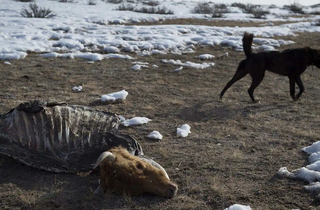The dzud, a Mongolian term for a harsh winter with heavy snowfall and extreme cold, has caused widespread hardship for herders who rely on their animals for income and survival. With the ground frozen and covered in snow reaching depths of up to 1 meter (3.3 feet), livestock are struggling to find food and shelter, leading to widespread deaths.
This winter has been particularly harsh, with over 80% of Mongolia experiencing significant snowfall. The country, known for being one of the last remaining nomadic societies, has recently declared a state of high alert due to the dzud and its devastating impact.
Livestock husbandry is considered crucial for diversifying Mongolia's economy, which is heavily reliant on mining. The recent losses represent a significant setback, with the national livestock population dropping from 64.7 million at the end of 2023 to a much lower number.
The Mongolian government is facing pressure to find solutions to the ongoing crisis and support the affected herders. The full extent of the economic and societal impact of the dzud remains to be seen, but it is clear that this harsh winter has dealt a heavy blow to Mongolia. (ILKHA)



 Dünya
Dünya
 Dünya
Dünya
 Güncel
Güncel
 Güncel
Güncel
 Güncel
Güncel
 Güncel
Güncel
 Güncel
Güncel
 Dünya
Dünya
 Dünya
Dünya
 Güncel
Güncel





